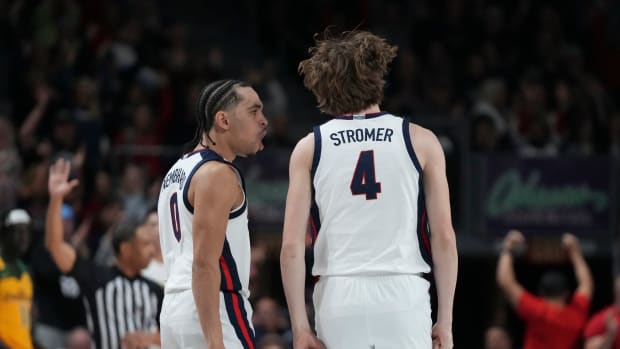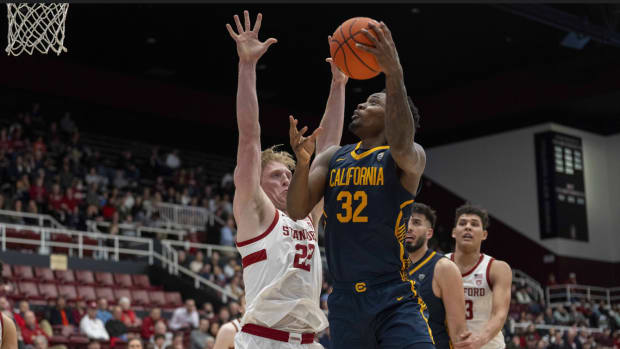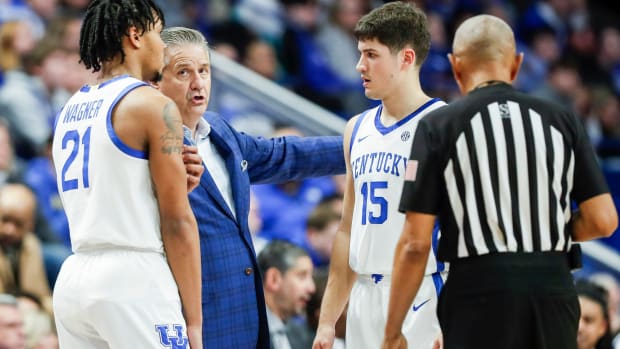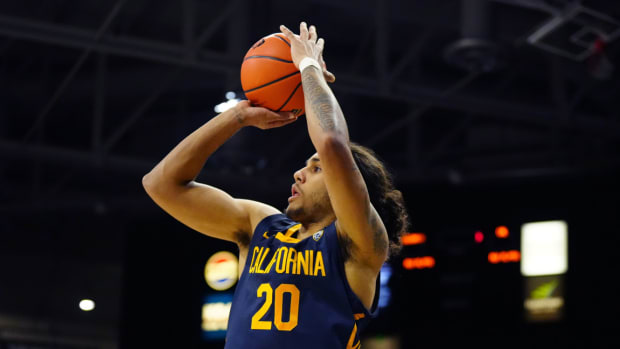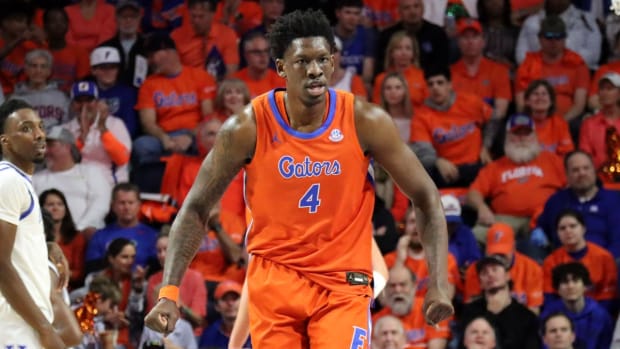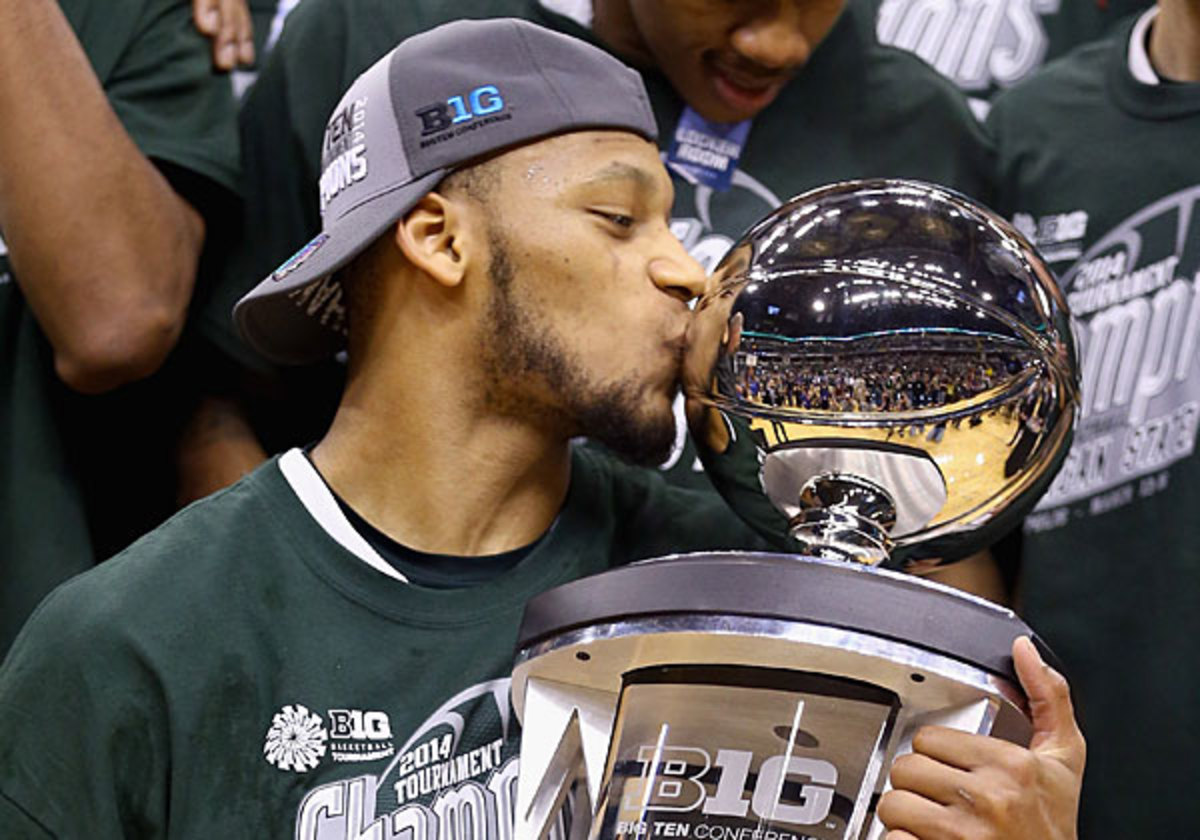
NCAA tournament: Kansas, Michigan State, UNC among best teams at each seed
With Adreian Payne back healthy the Spartans once again look like a title contender. (Andy Lyons/Getty Images)
Florida was declared the No. 1 overall seed for the NCAA tournament, but after that the seeds are treated as equals, with no official designation as to which one is considered better, at least not in the eyes of the selection committee. Below we present the best teams at each seed in the field of 68.
No. 1: Florida (South region)
The Gators have a 26-game win streak, went 18-0 in the SEC regular season and swept through their conference tournament. They've played the 10th-toughest schedule in the country and rank in the top 20 in both adjusted offense and defense. They are the No. 1 overall seed for good reason.
No. 2: Kansas (South)
This is assuming Joel Embiid is healthy, because when he is, Kansas is a national title favorite disguised as a team one line down from the top. Among the other two-seeds, Villanova (overly reliant on threes), Michigan (suspect defense) and Wisconsin (worse defense than Kansas) fall short.
No. 3: Iowa State (East)
Syracuse plays, by far, the best defense of all the No. 3s, ranking 18th in defensive efficiency. Duke and Creighton aren't even in the top 100. But the Cyclones are decent enough at 'D' (54th nationally) and have a top 15 offense and a barge-load of confidence after winning the Big 12 tournament.
GALLERY: Best seeds ever from No. 16 (Princeton, 1989) to No. (Kentucky, 1996)
No. 4: Michigan State (East)
Now at full strength – at least presumably – the Spartans may be the best team in their region but were nevertheless seeded behind three others. But its Big Ten tournament championship showed how dominant this groups is with a functional Keith Appling, Branden Dawson and Adreian Payne.
No. 5: Saint Louis (Midwest)
Yes, the Billikens have problems. They have lost four of five and surrendered more than a point per possession in the four defeats. But if Jim Crews' club corrects that, it can stifle just about anyone, as evidenced by the fact that it They rank 8th nationally in defensive efficiency.
No. 6: North Carolina (East)
It's a tough call given that the Tar Heels enter the NCAA tournament with two straight losses while Baylor (West region) surged all the way to the Big 12 tournament final. But North Carolina has the 22nd best defensive efficiency rating and the superior difference-maker in sophomore guard Marcus Paige.
No. 7: New Mexico (South)
It's fairly insane that the Lobos dropped this low, which surely Kansas and Syracuse and possibly Florida can't love. Cameron Bairstow is an All-America talent at center, and New Mexico won two of three against conference rival (and West No. 4 seed) San Diego State, including the rubber match in the Mountain West tournament final.
No. 8: Gonzaga (West)
Kentucky (Midwest) might be more dangerous, given its talent, but Mark Few's club has a better track record. The Bulldogs are 13th nationally in defensive efficiency and have a top 50 offense that might be even more lethal than that: Gonzaga shoots 49.8 percent as a team, a top-five figure.
No. 9: Oklahoma State (West)
With Gonzaga the choice as the best 8-seed, this might be the most intriguing first round matchup in the entire tournament. Marcus Smart's revival makes the Cowboys a threat to beat almost anyone in the bracket. They've won five of seven and the only two losses have been to Iowa State (a No. 3 seed, on the road) and Kansas (a No. 2 seed, in Kansas City), both in overtime.
No. 10: Arizona State (Midwest)
At this point of the seeding line, there are flaws aplenty. But the Sun Devils have a top 30 defense, an explosive scorer in Jahii Carson (18.6 points per game), a rim protector in Jordan Bachynski (4.1 blocks per game) and a proven ability to beat top teams, as evidenced by their takedown of Arizona last month.
No. 11: Tennessee (First Four/Midwest)
There's a strong case for both Providence, the Big East tournament champion, and Nebraska. And the Volunteers may not make it out of Dayton. But if they do, they have a top 30 offense and defense and their only loss in their last games came by seven points to Florida on a neutral court in the SEC semifinals.
No. 12: Stephen F. Austin (South)
We'll give it to the Lumberjacks, winners of 28 in a row. They play in-your-undershirt defense and go about their business with a looseness that should prevent them from being overwhelmed by the stage. Jacob Parker (14.2 points. 7.1 rebounds) sets the tone.
No. 13: Tulsa (South)
Tough call here between the Golden Hurricane and Manhattan. Both teams can guard, but Danny Manning's club might just do it a little better. Tulsa played a more rigorous non-conference slate – Wichita State, Creighton, Oklahoma – so it won't be overwhelmed by the prospect of facing UCLA in its first game.
No. 14: North Carolina Central (East)
This is pretty much a dead heat with Mercer. Both have one top 50 win and two losses to top 50 teams, though N.C. Central has the lone win over an NCAA tournament team (beating N.C. State on the Wolfpack's home floor). And the Eagles have a premium scorer in Jeremy Ingram (20.6 points per game).
No. 15: American (West)
The Eagles have a top 50 defense and four players averaging in double-figures, led by Jesse Reed's 13.9 points per game. Their top three scorers all shoot better than 50 percent from the floor. If American wasn't playing Wisconsin in Milwaukee, a de facto home game for the Badgers, it might have had upset potential.
No. 16: Weber State (West)
Davion Berry (19.1 points per game) and Kyle Tresnak (11.8 ppg, 60.5 percent shooting) helped the Wildcats to the Big Sky tournament title.
[si_video id="video_286A6D52-0424-7D57-8F22-B336A8B9025C" height="500"]

